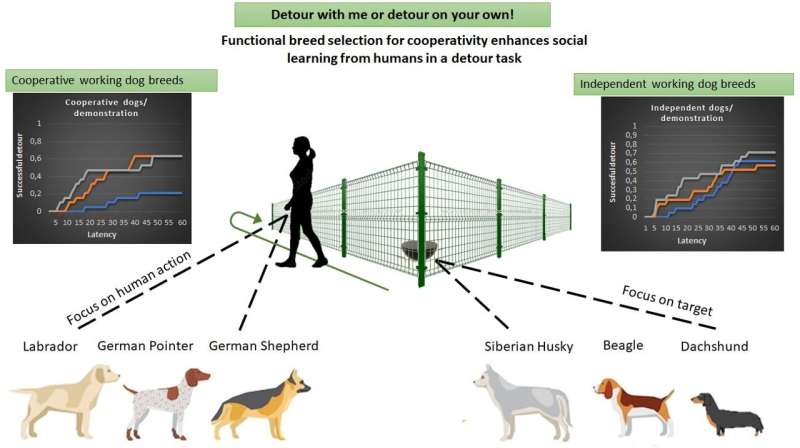Dog behavior study evaluates social learning among various breeds

A new study from the Department of Ethology, Eötvös Loránd University, showed that dogs may not equally benefit from observing the “helpful action” of a human demonstrator in the classic detour around a V-shaped fence task.
Those who are experienced with the world of ethological conferences, know all too well that if you present your work about dog behavior, the first (or second) question from the audience will be: “And did you check whether the breed of the dog had an effect on your results?”
Actually, this is not surprising as most people are familiar with the mindboggling variability of hundreds of dog breeds that differ not only in their appearance, but also in their behavior. It’s only natural to speculate that terriers would behave differently than Huskies, Border Collies would show different preferences than pointers, and so on.
There are of course many experiments in which ethologists found considerable breed differences. But social learning, which is the capacity for learning through observation of someone else’s actions, remained an interesting exception, until now. Although dogs are well known for their excellent ability to learn from other dogs, and more importantly, from humans, this significant feature remained stubbornly independent of their breed through more than two decades of investigations.
Now, with their new study published recently in the journal Animals, the researchers of the Department of Ethology showed that some dog breeds seem to be more honed towards human behavior than others, which helps them to improve their performance in an otherwise difficult spatial problem-solving task: to detour around an obstacle. Dr. Péter Pongrácz, who conducted many of the pioneering social learning experiments with dogs in the last two decades, was joined by Petra Dobos, an exceptionally promising undergraduate student, whose bachelor thesis was aimed towards the ambitious goal of finding breed-related differences behind dogs’ social learning skills.
The two researchers utilized the idea of sorting dog breeds into two functional groups: those who were selected for cooperatively working with their human handlers (such as herding dogs, pointers, retrievers); and those who mainly work without constant human guidance—the independent working dogs (such as terriers, sighthounds, spitz type breeds and livestock guarding dogs).
Dobos tested nearly 100 dogs in the well-known “V-shaped fence detour” test. Dogs had to find the reward behind the transparent wire-mesh fence, which is a hard task, as many dogs cannot perform the required detour within one minute, which is the standard duration of a trial.
Dogs were tested in three consecutive trials, either without any further help (control group); or after witnessing Dobos as she walked around the fence, demonstrating how to make a detour, before the second and third trials. Upon review of the results, it turned out that the independent and cooperative breeds were equally unsuccessful in the control condition, which was not a surprising result, regarding how hard is the detour task for dogs in general.
However, it turned out that when additional assistance was provided in the form of watching the helpful demonstrator, cooperative working dog breeds were in clear advantage.
Unlike their independently working cousins, cooperative dogs performed faster subsequent detours compared to their baseline trial. Independent dogs on the other hand, did not speed up their detours, even though they were also provided with the same demonstration of walking around the fence.
“The beauty of this finding lays in the fact that we did not find any specific dog breed to be especially talented in social learning,” said Pongrácz, supervisor of the research program. “The groups we assembled for the tests consisted of several unrelated dog breeds, positioned at distant branches on the genetic ‘tree’ of dogs, thus our results highlight the role of functional breed selection that has possibly been aimed at those capacities in dogs that enhance attention and interest towards human behavior.”
Dobos concluded the discussion with a remark regarding their future plans. “We won’t stop here of course. There are so many things still to discover, for example, whether the cooperative and independent dogs would equally regard our attention calling words interesting, or would we find the cooperative breeds as being more attracted to human encouragement?”
More information:
Petra Dobos et al, Would You Detour with Me? Association between Functional Breed Selection and Social Learning in Dogs Sheds Light on Elements of Dog–Human Cooperation, Animals (2023). DOI: 10.3390/ani13122001
Citation:
Dog behavior study evaluates social learning among various breeds (2023, June 26)
retrieved 26 June 2023
from https://phys.org/news/2023-06-dog-behavior-social.html
This document is subject to copyright. Apart from any fair dealing for the purpose of private study or research, no
part may be reproduced without the written permission. The content is provided for information purposes only.
For all the latest Science News Click Here
For the latest news and updates, follow us on Google News.

